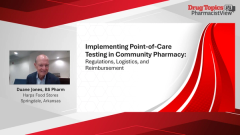
Regulatory Requirements and Credentialing for Pharmacy-Based Point-of-Care Testing
A panelist discusses how obtaining a Clinical Laboratory Improvement Amendments (CLIA) waiver is an essential regulatory step for pharmacies to perform point-of-care testing, followed by credentialing with payers to receive reimbursement for these services.
Episodes in this series

Regulatory Framework and Credentialing
Main Discussion Topics:
- CLIA waiver requirements and regulatory compliance
- Pharmacist credentialing process with payers
- Documentation and protocol development importance
Key Points for Physicians:
- 48 states allow pharmacists to perform point-of-care testing
- Pharmacy testing requires CLIA waivers
- Pharmacies must establish protocols similar to those in medical practice settings
Notable Insights:
- Credentialing is a one-time process that creates ongoing opportunity
- Creating standardized documentation during initial implementation simplifies future onboarding
- State health departments often provide guidance and support for implementing testing programs
Clinical Significance:
Although regulatory and credentialing processes require an initial investment of time, they establish the foundation for pharmacy-based clinical services that can expand health care access points and create sustainable revenue streams through formalized medical billing pathways.
Newsletter
Pharmacy practice is always changing. Stay ahead of the curve with the Drug Topics newsletter and get the latest drug information, industry trends, and patient care tips.





















